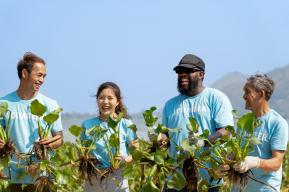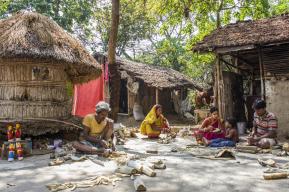Project
Be Resilient South Africa Project

Project Summary
Projection Duration: 2021-2023
Funding Amount: €1,500,000
Funding Partner: The Government of Flanders
Implementing partners: Department of Environment, Fisheries and Forestry, South African Weather Services, Department of Water and Sanitation, Kruger to Canyon Biosphere Reserve, Groot-Marico Biosphere Reserve, Cape Winelands Biosphere Reserve, Vhembe Biosphere Reserve and Collaborative Governance
Project Background
The severe impacts of droughts in South Africa over the last decade highlight the vulnerability of the country to water scarcity, a condition which is expected to worsen considerably due to climate change. There is therefore a need to include climate change impacts in medium to long term water planning, and to adopt ecosystem-based adaptation that ensure long-term sustainability. The proposed project introduces a novel, bottom-up participatory approach to climate change adaptation, providing an adequate planning pathway for decision making at the local, regional and national level. The project is funded by the Flemish Government, Belgium, as part of the bilateral development aid to South Africa.
Specific Project Objectives
The general objective of the BRSA project is to enable pilot areas in South Africa to develop effective ecosystem based and gender responsive adaptation pathways to climate change using a bottom-up, participatory approach, and by implementing effective monitoring and early warning tools to proactively manage increased climate risks.
Areas of Implementation
- Cape Winelands Biosphere Reserve, Western Cape Province, South Africa
- Vhembe Biosphere Reserve, Limpopo Province, South Africa
- Groot Marico Biosphere Reserve, North-West Province, South Africa
- Kruger to Canyons Biosphere Reserve, Limpopo and Mpumalanga Provinces, South Africa
Project Interventions
- Establish a bottom-up approach to climate change adaptation, ensuring an inclusive planning process for sustainable development of vulnerable municipalities under climate change scenarios in four target areas;
- Develop monitoring and early warning capacities for climate-related hazards and climate change indicators;
- Provide capacity building of national and local stakeholders and technology transfer on innovative tools for climate change adaptation and monitoring
Expected Results
Bottom-up approaches to ecosystem-based, climate change adaptation is demonstrated in key pilot areas and adopted at the national level, and supported by community-based climate risk monitoring and early-warning capacities that drive medium to long term climate informed decision making.
- Establish a bottom-up approach to climate change adaptation, ensuring an inclusive planning process for sustainable development of vulnerable municipalities under climate change scenarios in four target areas;
- Develop monitoring and early warning capacities for climate-related hazards and climate change indicators;
- Provide capacity building of national and local stakeholders and technology transfer on innovative tools for climate change adaptation and monitoring.
Achievements to Date
1. Climate Risk Informed Decision Analysis:
Climate Risk Analysis and Hydrological Modeling Workshops
- Stakeholder engagements and site visits were carried out in all target areas to better understand the landscape and report the first phase modeling results.
Tools Training Transfer to local institutions on Climate Risk Analysis
- Twenty-five professionals from government and academia were trained in the climate risk analysis methodology.
Community launch of the Be Resilient Project:
- Engagement of communities in Climate Risk Informed Decision Analysis (CRIDA) activities in all 4 target areas as implemented.
2. Early Warning and Disaster Risk Reduction:
"Internet of Things" Monitoring Network Pilot
- The deployment of IoT infrastructure for early warning systems, water security enhancement, and disaster risk reduction has been piloted in one of the target biospheres.
World Science Forum: Regional Man and Biosphere Youth Forum
- Facilitating the inclusion and empowerment of 12 young participants representing the four designated biosphere reserves, enabling their engagement in the World Science Forum, which encompassed participation in the 2022 Regional MaB Youth Forum.
3. Capacity Building and Citizen Sciences
Groot Marico Learning Exchange
- A collaborative partnership was forged between the USAID Resilient Waters Programme and all four biosphere reserves for the purpose aimed to exchange of insights regarding opportunities and challenges within the realm of Biosphere Reserves, with a specific emphasis on climate and ecosystem-based adaptation.
Citizen Science Data Collection and Analysis Solution training:
- Training on data collection procedures utilizing smartphone data collection and capacity development of 24 citizen scientists in two biosphere reserves was conducted.
Empowering Communities for Climate Resilience through Citizen Science and Climate Action
- A river health monitoring exercise in the Eerste and Blyde Catchment was conducted to gain a better understanding of the river's health. The training equipped 24 citizen scientists with knowledge and skills transfer.
Enhancing Sustainability: Biosphere Reserves Empowered in Funding Proposal Development and Resource Mobilization
- Comprehensive training on diversifying funding streams for biosphere reserves to support climate change adaptation activities training was conducted for all 10 Biosphere Reserves in South Africa.
3rd Catchment Indaba
- UNESCO Youth from the four target Biosphere Reserve representatives participated the Annual Catchment-Based Indaba on Ecological Infrastructure for Water Security in 2022.
International Indigenous People’s Day celebrations
- Commemoration of the International Indigenous People’s Day with a focus on the role of indigenous women and youth in climate change adaptation was conducted in 2022 and 2023.
Guy Broucke, Programme Specialist - Email: g.broucke@unesco.org









